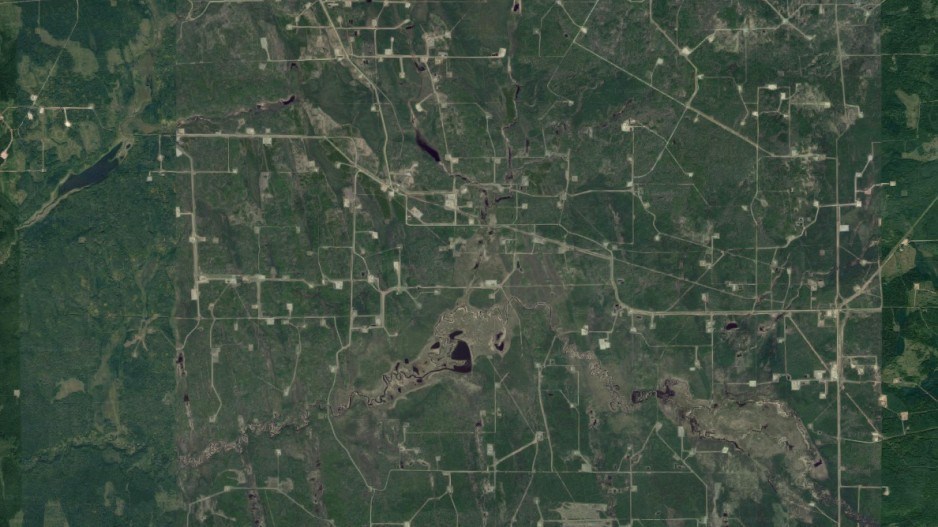Twenty resource development projects that had been approved by the provincial government in the Fort St. John region will have to be cancelled, unless those projects get the consent of the Blueberry River First Nation.
But 195 other previously approved forestry and oil and gas projects in the region can go ahead, under an agreement struck with the Blueberry River First Nation (BRFN).
The B.C. government and BRFN have arrived at an agreement in response to a landmark BC Supreme Court ruling earlier this year that found that the cumulative impacts of generations of development in the area infringed the Blueberry First Nations’ treaty rights.
The Blueberry River First Nation is a signatory to Treaty 8. It is one of only a handful of B.C. First Nations that signed a historical treaties. The treaty guaranteed signatories access to their traditional ways of life – hunting, fishing and trapping.
But decades of development – forestry, road-building, hydro-electric dams, transmission lines and natural gas extraction – gradually reduced the First Nations’ access to these traditional resources and practices. The cumulative impacts of these activities constituted a breach of treaty rights, the court ruled at the end of June.
Rather than appeal the decision, the B.C. government worked with the BRFN to come up with a plan to “heal” the land, restore wildlife habitat and re-establish some traditional practices, like hunting and trapping.
The agreement includes $65 million in funding to the First Nation, $35 million of which is to be used for land restoration.
The Fort St. John region is in the heart of B.C.’s natural gas industry, and is stitched with access roads and seismic lines for oil and natural gas well-pads, many of them now decommissioned. The funding will be used by the First Nation for things like road decommissioning, land, river and wetlands restoration, and building wildlife habitat connections.
Another $30 million is earmarked to help maintain or re-establish traditional practices, like hunting and trapping.
Going forward, industrial activity will need the First Nation’s approval.
“Twenty currently approved authorizations, which relate to development activities in areas of high cultural importance, will not proceed without further negotiation and agreement from Blueberry,” the B.C. government says in a press release. “The province has provided notification to the respective permit holders.
“The province and Blueberry are now working to finalize an interim approach for reviewing new natural resource activities that balance Treaty 8 rights, the economy and the environment.”
The 20 permits being deferred include eight forestry permits and 12 oil and gas permits.
As for the biggest project of all in Blueberry River First Nation territory -- Site C dam -- that will be a topic for an entirely different discussion.
"The province and Blueberry River First Nations have agreed to enter into a discussion about establishing a separate negotiation table related to Site C," the ministry of Indigenous Relations and Reconciliation said in an email to BIV News.
"Blueberry people have been raising the alarm bells for years about the increasing destruction of our territory and our way of life,” Blueberry River First Nation Chief Marvin Yahey said in a press release. “The court has issued a ruling in the strongest terms that puts an end to the government approval practices that have led us here.
“It has been a long battle and total vindication of Blueberry's position. But now, with this ruling, we finally see government taking the historic importance of this moment seriously. We are pleased to sit here with government today to announce a good faith first step in the journey to begin to heal the land, while supporting stability in our region.”
"This agreement is an excellent first step toward balancing Blueberry's treaty rights, environmental impacts and industry's need for stability and certainty," said Murray Rankin, minister of Indigenous Relations and Reconciliation. "It sets us on the road toward a future where Blueberry River First Nations members can fully exercise their Treaty 8 rights and everyone in the region can reap the rewards of good, family-supporting jobs."
After an interim agreement is in place to implement an ecosystem-based management approach that addresses cumulative impacts, a longer-term planning and management agreement will be implemented.
The BC government is also pledging to work with other Treaty 8 signatories in B.C. to extend a similar land management approach to them as well. Those other nations include Doig River, Fort Nelson, Halfway River, McLeod Lake, Prophet River, Saulteau and West Moberly First Nations.




